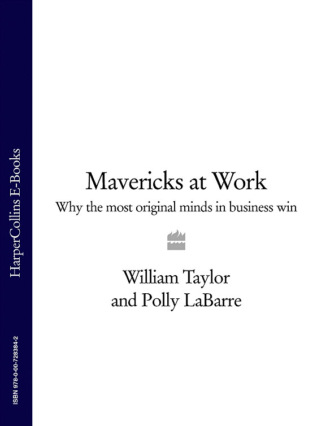
Полная версия
Mavericks at Work: Why the most original minds in business win
We can’t promise that Dave Balter’s maverick company—or any of the companies you meet in these pages for that matter—will thrive, without setbacks or reversals, for years to come. (The realities of competition are too treacherous for that.) We can’t promise that every technique or business practice we highlight will work as well in your organization as it does in the organizations we describe. (There’s a difference between learning from someone else’s ideas and applying them effectively somewhere else.)
What we can promise is that we’ve written a book that is as eye-opening, as energetic, as flat-out useful as we know how to make it, a book that aims to be true to the maverick spirit of the agenda it champions and the leaders it chronicles. To that end, we thought it would be useful for us to take the time, at four separate moments in the book, to highlight a set of Maverick Messages—the action-oriented essence of the ideas we explore and the stories we tell. We also thought it would be valuable to end the book with a collection of Maverick Material—resources that will help you keep learning long after you’ve finished reading.
We’re not sure what Henry Oldenburg and the seventeenth-century mavericks behind the Royal Society would think of the ideas and leadership practices we chronicle in Mavericks at Work. But we do know that the spirit of innovation and experimentation that they celebrated nearly 350 years ago feels alive and well in business today. We hope that the material in our book provides you with some guidance on your journey into the future. Good luck!
William C. Taylor
Polly LaBarre
www.mavericksatwork.com
November 2007
NOTES - INTRODUCTION
THE MAVERICK PROMISE
1. Alan Kay uttered his immortal words at an early meeting of the Xerox Palo Alto Research Center (PARC). He spent the 1970s at this hothouse of innovation. The full quote is even more instructive: “Don’t worry about what anybody else is going to do…. The best way to predict the future is to invent it. Really smart people with reasonable funding can do just about anything that doesn’t violate too many of Newton’s Laws.” For more on Alan Kay, see his organization’s Web site (www.viewpointsresearch.org).
2. Pete Carril’s career record at Princeton was 514–261. His teams won 13 Ivy League crowns and held their own against many powerhouse programs. See The Smart Take from the Strong: The Basketball Philosophy of Pete Carril by Pete Carril with Dan White (University of Nebraska Press, 2004).
3. There’s more than a little mythology surrounding the origins of the word “maverick.” In The New Language of Politics (Random House, 1968), word maven William Safire repeats a colorful (but wholly inaccurate) story about Samuel Augustus Maverick: “Old man Maverick, Texas cattleman of the 1840s, refused to brand his cattle because it was cruelty to animals. His neighbors said he was a hypocrite, liar, and thief, because Maverick’s policy allowed him to claim all unbranded cattle on the range. Lawsuits were followed by bloody battles, and brought a new word to our language.”
In fact, Samuel Augustus Maverick (1803–70) was a graduate of Yale, a signer of the Texas Declaration of Independence, and a fabulously successful land speculator who cared little about cattle. (Maverick County in southwest Texas is named in his honor.) When someone repaid a debt with 400 head of cattle rather than cash, Maverick’s caretakers allowed them to wander unbranded. Over time, locals who saw unbranded cattle would say, “Those are Maverick’s”—and a term was born that today refers to politicians, entrepreneurs, and innovators who refuse to run with the herd. (Not to mention Tom Cruise’s fighter-pilot character in Top Gun.)
In a neat twist of fate, several of Samuel Maverick’s descendants became legendary political figures in Texas with an undeniable, well, maverick streak. His grandson, Maury Maverick Sr., was a pro-FDR congressman during the New Deal and one of San Antonio’s most controversial mayors. (Maury Maverick Sr. famously coined another term—“gobbledygook”—to describe his interactions with New Deal agencies.) Samuel Maverick’s great-grandson, Maury Maverick Jr., was a crusading lawyer, legislator, and newspaper columnist who championed free speech and civil rights. In many respects, the Maverick tradition is to San Antonio politics what the Kennedy tradition is to Boston politics—colorful, influential, and impossible to ignore.
For accurate information on the Maverick family and the term itself, see these sources: Turn Your Eyes Toward Texas: Pioneers Sam and Mary Maverick by Paula Mitchell Marks (Texas A&M University Press, 1989); “Mavericks Are Texas-Grown” by Leon Hale, Houston Chronicle, January 23, 2004; “The Last Maverick” by Jan Jarboe Russell, Texas Monthly (July 2003). Another go-to source is The Handbook of Texas Online (www.tsha.utexas.edu/handbook/online), which has entries on multiple generations of the Maverick family as well as on the terms “mavericks” and “mavericking.”
PART ONE
Конец ознакомительного фрагмента.
Текст предоставлен ООО «ЛитРес».
Прочитайте эту книгу целиком, купив полную легальную версию на ЛитРес.
Безопасно оплатить книгу можно банковской картой Visa, MasterCard, Maestro, со счета мобильного телефона, с платежного терминала, в салоне МТС или Связной, через PayPal, WebMoney, Яндекс.Деньги, QIWI Кошелек, бонусными картами или другим удобным Вам способом.


